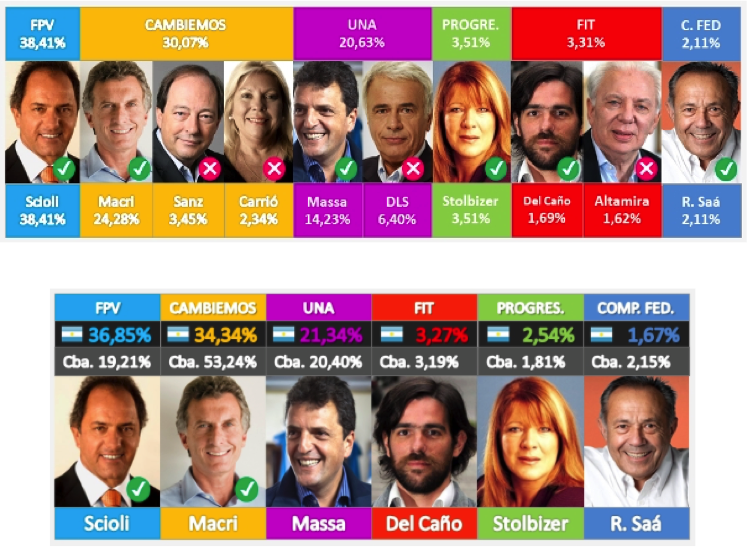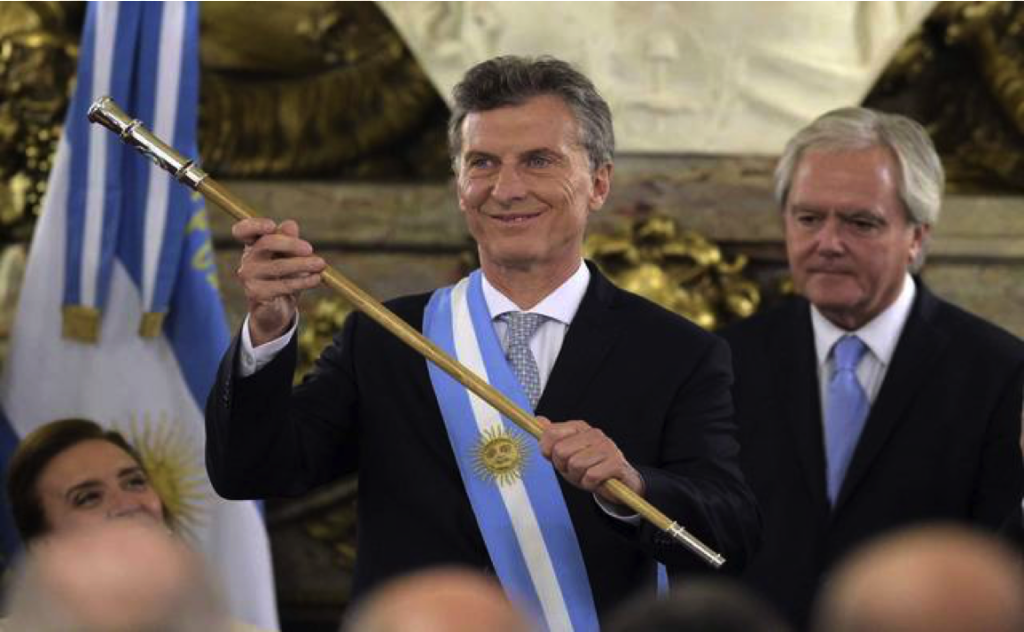In the first run-off election in the history of Argentina, the people’s voice demonstrated a drastic change for the future of Argentina and potentially the international community.
On 9 August 2015, all seemed certain that Frente Para La Victoria (FPV) candidate Daniel Scioli was destined to continue the current 12-year reign of the Peronist Party in Argentina. However, after the presidential primary elections were held the assurance that Argentina would continue marching under the same political party rapidly disintegrated with every passing day. As the days and months grew nearer to the presidential elections on 25 October 2015, the voice of the Argentine voters echoed one unified idea: change. The people of Argentina rallied behind a new hope and a new image of an improved future. The face of that future rested in the ideas, initiatives, and spirit of one man that led not only a young political party, but a significant social movement. That man was Mauricio Macri.

Bottom: Presidential Elections, 25 October 2015
A Rising Opposition
Macri was the face of the political opposition, “Cambiemos,” (Lets Change) and rightfully so as he started the party just eight years ago when he ran for and was elected mayor of the City of Buenos Aires. Many would describe Macri as a well-connected businessman whose party was considered by so many as having a long shot to win the elections and lacking the political influence to govern the country. However, with every passing election in 2015, “Cambiemos” demonstrated the power of a socially connected and driven movement.
First, Horacio Larreta maintained the influence of the Cambiemos party within the city of Buenos Aires when he was elected mayor on 19 July 2015. A few months later during the primary elections, Maria Vidal defeated Anibel Fernandez (FPV) to claim the governorship of the Province of Buenos Aires. So as the first national run-off election approached on 22 November 2015, the strength and the support for the Cambiemos movement should not have come as a surprise to the FPV Party. However, even with the energy behind the Cambiemos Party and Macri’s continual climb, he was substantially aided by three significant flaws made by Scioli, the FPV Party, and the current government.
The Lead up to the Election
The first of those errors occurred immediately following the primary elections in August 2015 when the Province of Buenos Aires suffered a significant natural disaster. In the two weeks that followed the primary elections, the Province of Buenos Aires received more than 14 inches of rain causing water levels in some areas to raise more than 30 inches and forcing the evacuation of more than 30,000 residents. The storm was one of the worst in history. As the storms started, then Governor of Buenos Aires, Daniel Scioli, departed for Italy to receive treatment on his prosthetic arm while leaving little to no plan to resolve the dire situation. So as Scioli remained in Italy, the floods continued to worsen and Macri remained as the strongest voice of support to aid those in need and provide a plan to assist with the situation.
The second event that continued to deflate Scioli’s campaign occurred on 5 October 2015 during the first-ever presidential debate. The debate consisted of all Presidential candidates except Scioli who elected not to participate. In the events leading up to the debate, Scioli stated that nothing good comes from a debate. A portion of that comment proved to be true, but the reality was that nothing good came for Scioli. As Scioli watched from a distance, the other five candidates used the forum to promote their ideas and highlight the flaws of the current frontrunner, Scioli, resulting in a significant drop in polls for Scioli the following week.

The third and most powerful of the issues that led to Scioli’s defeat was his relationship, or better said, lack of relationship, with the FPV Party and the current President Cristina Fernandez de Kirchner. With every passing day after the primary elections, Scioli attempted to separate himself from the criticisms of the Kirchner government in order to obtain more of the votes needed to achieve 45% of the popular vote and avoid a runoff election. However, in doing so, he continued to lose the confidence and support of his party, so much so that President Kirchner would not publicly endorse her support for him as a candidate, an endorsement she did with many other FPV candidates. Furthermore, a week before the runoff election, President Kirchner affirmed that if Scioli was to lose, his decline was not a fault of her or the FPV Party, but that of the actions of Scioli. And as predicted by many, Scioli was defeated. Scioli started as a candidate who presented a grand idea for the future of Argentina, but ultimately lacked the plan, conformity, and energy to continue the reign of the FPV party.
Daniel Scioli’s collapse was fast and essentially unstoppable after the first initial polls in July when he garnered close to 50% of the vote with more than 10 presidential candidates. However, at the end of November when there were only two candidates, he was unable to achieve 50% of the vote to secure the presidency. Thus, Scioli fell to Macri in the runoff election by close to 4% of the popular.

Moving Forward
The defeat of the FPV Party and the victory of the Cambiemos Party signal a new future in the domestic and international relations of Argentina. As President Macri donned the presidential sash and grabbed hold of the presidential scepter, he takes office with grand ideas to improve the international relations of Argentina most notably with the United States and European leaders. Furthermore, President Macri vows to improve the security situation surrounding the increased drug trade in Argentina as well as improve critical infrastructure along major routes throughout the country. Lastly, among many issues that Macri strives to improve, he looks to take strong and swift action to improve the rapidly devaluating peso that has plagued the people of Argentina for the past two years.
Many of Macri’s right-wing ideas demonstrate a significant shift in the mentality and actions of the future government of Argentina. The question that remains is whether that shift will provide that “change” that Argentines voted for during the country’s first runoff election. Nevertheless, one can expect to see a different domestic and international Argentina in the years to come.
CPT Jonathan Nielsen is a U.S. Army Infantry Officer with combat experience in multiple countries in the Middle East and extensive multinational training experience with various NATO partners. He is currently attending the University of Belgrano in Buenos Aires. The views expressed in this article are those of the author and do not reflect the official policy or position of the U.S. Army, the Department of Defense, or the U.S. Government.

